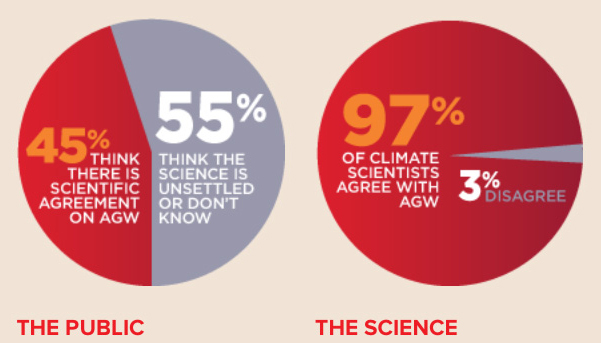An important peer-reviewed study was published today by John Cook et al. in the journal Environmental Research Letters. John Cook runs the well-known Skeptical Science website that rebuts global warming misinformation. His new research once again confirms there is overwhelming agreement amongst climate scientists – over 97 percent agree – and in the scientific literature – over 97 percent of papers confirm – that global warming is real and largely caused by humans. However, current surveys of the U.S. public, such as those done by the Pew Center and Yale, show that less than half the population believe scientists are in agreement on the issue of human-caused climate change.
Let’s do a classic “thought experiment” (it’s only classic because climate scientists have been telling this one for so many years now). Imagine you went to 100 medical experts and asked each of them to diagnose whether you had cancer or not. If 97 of those hundred confirmed your worst fears and verified that you did indeed have cancer, would you keep asking for more evidence before you did something about it? Most people would have a hard time ignoring that kind of agreement amongst experts! Except, it seems, when the experts we’re talking about are climate scientists and the subject is the consequences of burning so much coal and oil and destroying so many tropical forests.

Less than half of the American public recognizes that scientists agree on Anthropogenic Global Warming, despite the fact that 97% of climate scientists endorse the science. Source: The Pew Center, Cook et al (ERL), The Consensus Project
The meme that “scientists don’t agree on whether humans are affecting global warming” is one that I still hear frequently from the public in my job as a climate scientist. There’s a big gap between what climate scientists know and what the public thinks. Researchers call this the “Consensus Gap“. The science is clear. But because public perception of scientific consensus is an important element for public support of action for climate change, this gap needs to be narrowed so that we can move ahead with policies to reduce heat-trapping emissions. Corporate-funded groups that spread misinformation in the media are partly to blame, as exposed in a recent UCS report about disinformation on climate science.
Looking over more than a twenty year period from 1991 to 2011, Cook’s new study finds the number of peer-reviewed papers that reject outright the scientific consensus on human-caused global warming “is a vanishingly small proportion of the published research.” In fact, of almost 12,000 abstracts analyzed by the authors, less than 80 rejected the claim that global warming is exacerbated by human activity. That’s less than one percent. Not even one doctor out of our hundred giving us a contrarian health report on this one!
This is not the first study of its type by any means. There is no shortage of published research on the consensus of climate scientists and climate science publications when it comes to anthropogenic warming. You can read Oreskes 2004, Oreskes 2007, Doran and Zimmerman 2009, and Anderegg et al. 2010. In addition, there are statements that verify the scientific claims about human-caused warming from 18 different scientific societies in the United States and more than a dozen national academies of science from around the world. And there are countless blogs on the topic including an analysis of over 13,000 papers by James Powell. Phew – consensus!
It’s telling that the analysis found so many papers that didn’t explicitly state whether or not human activity is causing climate change. That’s because scientists have known for so long that it is. It’s a given now, like gravity or the laws of motion. In recent years, in fact, scientists have focused much more on the consequences of climate change. Hopefully, this new analysis will help narrow the consensus gap with the public so we can start making decisions about adaptation and reducing emissions based on the science.
It’s also worth noting that Cook’s research was also conducted mostly by volunteers, with the publication costs funded by donations on social media websites. The paper is part of a new genre of publicly accessible peer-reviewed science. It is available free of charge for download here from Environmental Research Letters.
